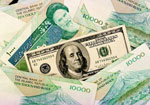 AFP: The United States is working to block sales of gold to Iranians in order to undermine their currency the rial and to step up pressure on Tehran over its nuclear program, officials said Wednesday. By Paul Handley
AFP: The United States is working to block sales of gold to Iranians in order to undermine their currency the rial and to step up pressure on Tehran over its nuclear program, officials said Wednesday. By Paul Handley
 WASHINGTON (AFP) — The United States is working to block sales of gold to Iranians in order to undermine their currency the rial and to step up pressure on Tehran over its nuclear program, officials said Wednesday.
WASHINGTON (AFP) — The United States is working to block sales of gold to Iranians in order to undermine their currency the rial and to step up pressure on Tehran over its nuclear program, officials said Wednesday.
From July 1, the US will ban sales of gold by anyone to either the Iranian government or to Iranian citizens, a senior US Treasury official said.
Washington has warned Iran’s neighbors Turkey and the United Arab Emirates, key regional centers of the gold trade, to stop gold sales to Iran, said David Cohen, treasury under-secretary for terrorism and financial intelligence.
“We have been very clear with the governments of Turkey and the UAE and elsewhere, as well as the private sector that is involved in the gold trade, that as of July 1 all must stop, not just trade to the government,” he said.
Cohen told the Senate Foreign Relations Committee that the US government continues to find new ways to isolate Iran from the international financial system.
“In particular, we are looking carefully at actions that could increase pressure on the value of the rial,” he said.
“One thing that we have seen in the course of the last year is when the rial depreciates and depreciates rapidly, that begins to create a dynamic in Iran that has an effect.
“It has an effect on the elites and their perception of how the country is behaving.”
The move to block gold sales is part of the effort to further weaken the rial, he explained.
“There’s a tremendous demand for gold among private Iranian citizens, which in some respects is an indication of the success of our sanctions.”
“They are dumping their rials to buy gold as a way to try to preserve their wealth. That is I think an indication that they recognize that the value of their currency is declining.”
Cohen and another senior official, US State Department Under Secretary for Political Affairs Wendy Sherman, told the committee that sanctions were having a deep impact on Tehran.
He said a ban on oil exports was costing Tehran between $3 and 5 billion a month and caused the economy to contract by as much as eight percent last year.
Sherman said 14 out of 20 importers of Iranian oil have ended their purchases, and the other six — China, India, Turkey, South Korea, Japan and Taiwan — have significantly reduced their imports.
“We are continuing, of course, to press them for further significant reductions as is required under the law,” she told the committee.
Cohen said the rial fell from 16,000 to 36,000 to the dollar on the open market since the start of 2012, forcing the Iranian central bank to tighten foreign currency supplies and driving inflation to more than 30 percent.
He said the US would step up pressure on other Iranian sources of foreign currency, including exports of petrochemicals, which “may offer a meaningful opportunity to gain additional leverage.”
Overall the sanctions are having an impact, he argued, as the country resists international pressure over its suspected nuclear program.
“Perhaps the clearest evidence of this comes from the recent negotiating sessions in Almaty, Kazakhstan,” Cohen said, referring to talks between Tehran and the “P5+1” — the five members of the UN Security Council plus Germany.
“During those meetings, the Iranian side sought sanctions relief in exchange for concessions on their nuclear program. They would not have done so had the impact of sanctions not affected their calculus.”
“In this last Almaty session, they raised, for the first time, wanting sanctions relief,” Sherman added.
“They talked about the specific sanctions relief. They wanted so clearly now they are willing say, yes, the sanctions matter. They do want to see an end to them.”
Even so, she noted, those talks came to naught, with a “significant gulf” still between the two sides.


